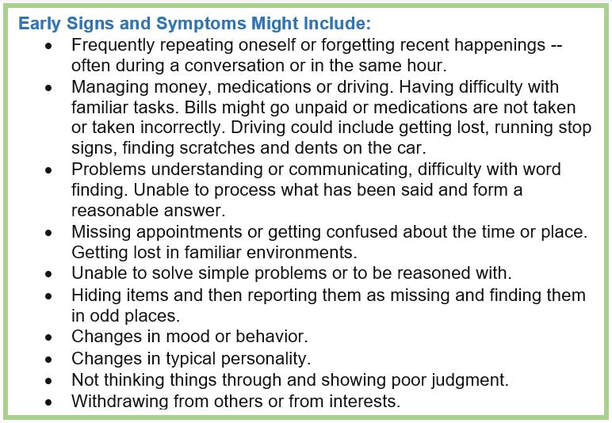Listen to our podcasts on dementia with Carole Klingler and Gene,
a caregiver at the Memory Cafe. Go here.
Early Signs of Decline and Dementia
|
by Carole Klingler, RN, BSN
|
Vertical Divider
Lorain County, State and National Dementia Resources
For the listing, go here |
Cognition is defined as the mental action or process of acquiring knowledge and understanding through thought, experience and the senses.
Dementia is a syndrome made up of the signs and symptoms that often lead to a specific diagnosis of a cognitive deficit.
Examples would include a diagnosis of Alzheimer’s, Parkinson’s, Lewy Body, Vascular, or Frontal Temporal Lobe Dementias. Some sources report that there could be more than 50 different reasons for a cognitive decline.
Early detection is important in evaluating and supporting a person with cognitive decline and dementia. (Article continues after the box.)
Dementia is a syndrome made up of the signs and symptoms that often lead to a specific diagnosis of a cognitive deficit.
Examples would include a diagnosis of Alzheimer’s, Parkinson’s, Lewy Body, Vascular, or Frontal Temporal Lobe Dementias. Some sources report that there could be more than 50 different reasons for a cognitive decline.
Early detection is important in evaluating and supporting a person with cognitive decline and dementia. (Article continues after the box.)
Simple Tasks Become More Challenging
Signs and symptoms usually impact a person’s ability to function in daily situations.
What once seemed to be a simple task might now appear complex. Often the inability to manage finances is a key indicator. Getting lost in familiar locations and losing the ability to retrace one’s steps is another sign that something is not right.
Negative behaviors, such as agitation and frustration, can indicate that a person is feeling overwhelmed or having difficulty keeping up with conversations. Often a person will withdraw from activities and might show signs of depression.
Anxiety might be another indicator, especially when it involves problem solving for simple issues. For example, if someone cannot find their glasses but they have multiple pairs and can use another pair, they might become obsessed and panicked to find the one they misplaced.
Demonstrating poor judgment or having impulsive behaviors can be another early indicator.
Appearing to not care or becoming apathetic is another indicator.
Changes in mood or behaviors that are not typical for an individual should warrant a medical work up to assess cognition.
Signs and symptoms usually impact a person’s ability to function in daily situations.
What once seemed to be a simple task might now appear complex. Often the inability to manage finances is a key indicator. Getting lost in familiar locations and losing the ability to retrace one’s steps is another sign that something is not right.
Negative behaviors, such as agitation and frustration, can indicate that a person is feeling overwhelmed or having difficulty keeping up with conversations. Often a person will withdraw from activities and might show signs of depression.
Anxiety might be another indicator, especially when it involves problem solving for simple issues. For example, if someone cannot find their glasses but they have multiple pairs and can use another pair, they might become obsessed and panicked to find the one they misplaced.
Demonstrating poor judgment or having impulsive behaviors can be another early indicator.
Appearing to not care or becoming apathetic is another indicator.
Changes in mood or behaviors that are not typical for an individual should warrant a medical work up to assess cognition.
LIFE’s Memory Café in Wellington
|
Carole Klingler, CEO
LIFE: A Dementia Friendly Foundation www.dflife.org 440-935-3506 [email protected] |
“Join us every Monday in Wellington from 10 a.m. to 2 p.m. for LIFE’s Memory Café,
an inspired gathering for those with dementia and their caregivers.
You’ll enjoy art, music and pet therapy, plus games, exercise, peer support and lunch --
all at no cost to participants. The new location is the Bethany Lutheran Church at
231 East Hamilton Street, Wellington.” -- Carole
For other Memory Café locations in Lorain and Wayne counties, go to https://www.dflife.org/locations.html
an inspired gathering for those with dementia and their caregivers.
You’ll enjoy art, music and pet therapy, plus games, exercise, peer support and lunch --
all at no cost to participants. The new location is the Bethany Lutheran Church at
231 East Hamilton Street, Wellington.” -- Carole
For other Memory Café locations in Lorain and Wayne counties, go to https://www.dflife.org/locations.html
About Carole Klingler and LIFE
Carole Klingler, RN, BSN, is CEO and Co-Founder of “LIFE: a Dementia Friendly Foundation” (www.dflife.org), a grassroots ministry. LIFE is a proud Partner of THRIVE! Southern Lorain County.
Founded in October 2016, LIFE’s mission of faith is to partner with anyone who has been touched by dementia and offer resources, education and engaging activities that improve the quality of life and enable those affected to live more independently longer.
LIFE is an acronym for “Linking Individuals and Families through Education and Engagement.” The organization provides four-hour Memory Cafés at local churches once a week. There is no cost to attend and people are free to leave at any time. A lunch is always provided.
At the Cafés participants and caregivers are warmly welcomed and encouraged to engage in activities geared toward their interests and abilities. Socialization and holistic support utilizing staff, volunteers and community support are provided through exercise, art, music and interaction with college students. The welcoming environment breaks down barriers to support through education and engagement.
Carole began her career as an ICU nurse at a Cleveland hospital, and served 10 years as Director of Nursing for Kendal at Oberlin, a continuing retirement community. For 10 years, she has served as the Lorain County Team Leader and Community Facility Coordinator for Northeast Ohio’s largest nonprofit hospice and palliative care organization.
Carole earned a Bachelor of Science in Nursing degree from Indiana Wesleyan University and is a Certified Dementia Practitioner and one of three Master Trainers for Dementia Friends Ohio.
Founded in October 2016, LIFE’s mission of faith is to partner with anyone who has been touched by dementia and offer resources, education and engaging activities that improve the quality of life and enable those affected to live more independently longer.
LIFE is an acronym for “Linking Individuals and Families through Education and Engagement.” The organization provides four-hour Memory Cafés at local churches once a week. There is no cost to attend and people are free to leave at any time. A lunch is always provided.
At the Cafés participants and caregivers are warmly welcomed and encouraged to engage in activities geared toward their interests and abilities. Socialization and holistic support utilizing staff, volunteers and community support are provided through exercise, art, music and interaction with college students. The welcoming environment breaks down barriers to support through education and engagement.
Carole began her career as an ICU nurse at a Cleveland hospital, and served 10 years as Director of Nursing for Kendal at Oberlin, a continuing retirement community. For 10 years, she has served as the Lorain County Team Leader and Community Facility Coordinator for Northeast Ohio’s largest nonprofit hospice and palliative care organization.
Carole earned a Bachelor of Science in Nursing degree from Indiana Wesleyan University and is a Certified Dementia Practitioner and one of three Master Trainers for Dementia Friends Ohio.
THRIVE! Southern Lorain County
Telephone: 440-987-9182
Email: [email protected]
Facebook: www.facebook.com/thrivesoloco
Telephone: 440-987-9182
Email: [email protected]
Facebook: www.facebook.com/thrivesoloco







